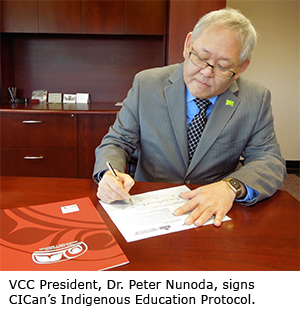Archive 2013-2019
VCC signs CICan’s Indigenous Education Protocol
Vancouver, B.C. - Today, Vancouver Community College (VCC) signed Colleges and Institutes Canada’s (CICan) historic Indigenous Education Protocol. This aspirational document reaffirms the college’s commitment to Indigenous education and provides a vision of how it will strive to improve and better serve Indigenous peoples.
VCC is committed to providing culturally relevant programs and services that support enrolment, retention and success of Aboriginal higher learners in Metro Vancouver.
As a leader in Aboriginal education, VCC offers innovative and unique programs, and is committed to community partnerships and career training.
“At VCC, we ensure that our Aboriginal students receive top-notch education from an institute that is as committed to them as they are to us,” says VCC President, Dr. Peter Nunoda.

The Indigenous Education Protocol was developed by CICan’s Indigenous Education Committee, comprising college and institute representatives from across the provinces and territories, as well as through consultations held at the Serving Indigenous Learners and Communities Symposium in December 2013, and the CICan annual conferences in 2013 and 2014.
“As key providers of applied post-secondary education for Indigenous communities, colleges and institutes recognize that they have important responsibilities and obligations to Indigenous education,” says Denise Amyot, President and CEO of CICan. “This protocol will encourage our members to be even more inclusive of Indigenous cultures and even more proactive in eliminating the barriers to education that many Indigenous learners still face.”
VCC’s hands-on approach and relevant real-world training provide students with the skills and knowledge they need to succeed in the classroom, at work, and in life – from basic education to career training and applied bachelor’s degrees.
Colleges and Institutes Canada is the national and international voice of Canada’s publicly-supported colleges, institutes and polytechnics. They work with industry and social sectors to train 1.5 million learners of all ages and backgrounds at campuses serving over 3,000 urban, rural and remote communities in Canada. The Association operates in 29 countries via 13 offices around the world.
